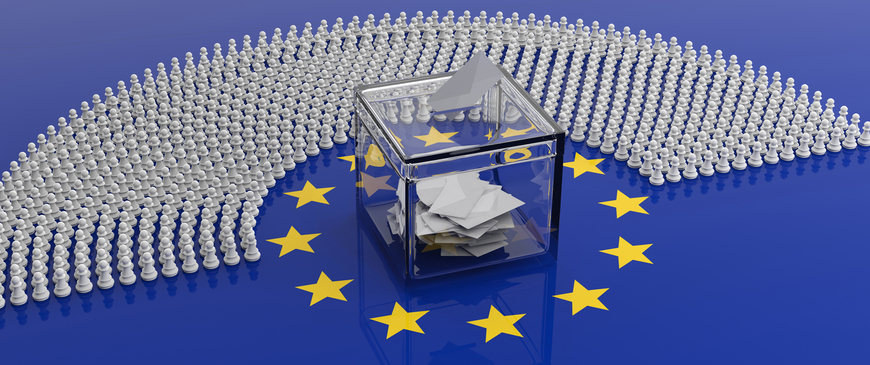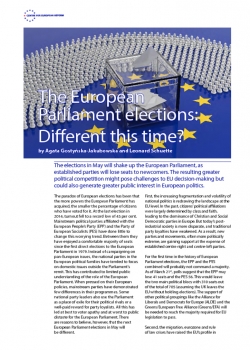
The European Parliament elections: Different this time?
The elections in May will shake up the European Parliament, as established parties will lose seats to newcomers. The resulting greater political competition might pose challenges to EU decision-making but could also generate greater public interest in European politics.
The paradox of European elections has been that the more powers the European Parliament has acquired, the smaller the percentage of citizens who have voted for it. At the last election in 2014, turnout fell to a record low of 43 per cent. Mainstream political parties affiliated with the European People’s Party (EPP) and the Party of European Socialists (PES) have done little to change this worrying trend. Between them they have enjoyed a comfortable majority of seats since the first direct elections to the European Parliament in 1979. Instead of campaigning on pan-European issues, the national parties in the European political families have tended to focus on domestic issues outside the Parliament’s remit. This has contributed to limited public understanding of the role of the European Parliament. When pressed on their European policies, mainstream parties have demonstrated few differences in their programmes. Some national party leaders also use the Parliament as a place of exile for their political rivals or a well-paid reward for party loyalists. All this has led at best to voter apathy and at worst to public distaste for the European Parliament. There are reasons to believe, however, that the next European Parliament elections in May will be different.
Increasing fragmentation and volatility of national politics is redrawing the landscape at the EU level.
First, the increasing fragmentation and volatility of national politics is redrawing the landscape at the EU level. In the past, citizens’ political affiliations were largely determined by class and faith, leading to the dominance of Christian and Social Democratic parties in Europe. But today’s post-industrial society is more disparate, and traditional party loyalties have weakened. As a result, new parties and movements, often more politically extreme, are gaining support at the expense of established centre-right and centre-left parties.
For the first time in the history of European Parliament elections, the EPP and the PES combined will probably not command a majority. As of March 21st, polls suggest that the EPP may lose 41 seats and the PES 56. This would leave the two main political blocs with 310 seats out of the total of 705 (assuming the UK leaves the EU without holding elections). The support of other political groupings like the Alliance for Liberals and Democrats for Europe (ALDE) and the Greens/European Free Alliance (Greens/EFA) will be needed to reach the majority required for EU legislation to pass.
Second, the migration, eurozone and rule of law crises have raised the EU’s profile in domestic debates. EU membership still enjoys widespread support, but voters have become increasingly wary of European policies that affect the principal powers of the state and thereby citizens’ sense of identity. Eurosceptic parties, hostile to immigration, European integration and globalisation, have been the main beneficiaries. Unlike the mainstream parties, they campaign passionately in European elections and fuel concerns about EU overreach by accusing Brussels (often falsely) of interfering unnecessarily in people’s lives.
The eurosceptics’ ability to influence policy, or at least disrupt the European agenda, will depend on whether they can put their considerable differences aside and unite.
The eurosceptics’ ability to influence policy, or at least disrupt the European agenda, will depend on whether they can put their considerable differences aside and unite. At present, they are divided into different groups and have struggled to influence the EU decision-making process. Recent polls suggest that eurosceptics, collectively, will get about a quarter of the seats. This poll excludes eurosceptic parties from Britain, which in the last election performed particularly well. At the time of writing it is unlikely but not impossible that the UK will take part in the European elections. Its participation would probably increase the eurosceptics’ overall vote share.
Matteo Salvini, Italy’s interior minister and head of the League, and Marine Le Pen, head of the French National Rally, have sought to build a pan-European party of nationalists, but may not succeed. Most eurosceptics have toned down their anti-EU rhetoric because there is no public appetite in other member-states to follow the UK out of the EU. Nevertheless, there are fundamental differences between opponents of European integration, like the National Rally, and economically liberal groups, like the Danish People’s Party, that want to maintain the EU single market. The eurosceptics also do not see eye to eye in other areas. Russia is one example: Poland’s governing Law and Justice party takes a tough line, while the League has close contacts with the Kremlin. On Schengen, the League demands that refugees who arrive in Italy should be redistributed among other member-states, but the Finns Party and The Sweden Democrats do not agree. On the EU budget, northern eurosceptics want to reduce the payments that Central and Eastern Europeans rely on.
May’s elections, however, are not just about the eurosceptic parties. Avowedly pro-Europe parties and movements, like French President Emmanuel Macron’s La République en Marche, are also on the rise, as are Green parties in some western European countries, as well as transnational movements like Volt Europe or the European Spring. Their pro-European vision is also a marked shift from the status-quo politics espoused by traditional parties like the German Christian Democratic Union. Unlike the mainstream parties, many of these newcomers are making a big effort to engage citizens on European issues, for example with calls for stronger EU democratic legitimacy or greater budgetary solidarity among euro-area countries.
Losses by established parties, growing polarisation, and competing visions of the EU will produce a more fragmented European Parliament.
Losses by established parties, growing polarisation, and competing visions of the EU will produce a more fragmented European Parliament. The media hype about an incipient eurosceptic takeover of the parliament is exaggerated; a majority of members of the European Parliament will still back European integration. But the European Commission will find parliamentary majorities for its legislative proposals harder to come by, because the traditional voting blocs will be replaced by more ad-hoc cross-party coalitions. This fragmentation of European politics could empower both ALDE and the Greens/EFA, whose support might be needed to form majorities.
This political splintering could also undermine the Spitzenkandidaten process, whereby the candidate of the European political family with the largest number of MEPs becomes the president of the European Commission. The EPP will probably win the most seats, but to achieve a majority for Manfred Weber, its Spitzenkandidat, it is likely to need the backing not only of PES but also ALDE. The latter is unlikely to vote for Weber, however, because of his previous support for the Fidesz party of Hungarian Prime Minister Victor Orbán, ALDE is a fierce critic of Orbán’s increasingly authoritarian approach.
The dominance of mainstream parties with indistinguishable policies, and a lack of public understanding of what the European Parliament does, have contributed to ever-decreasing turnout in the European elections. But the emergence of a range of new political movements looks set to shake things up. A more fragmented European Parliament might make the European decision-making process more troublesome and fractious. But it could also be a boon for European democracy. Greater political competition on the EU level could increase public interest in the European Parliament elections – and that would be a healthy development for the EU.
Agata Gostyńska-Jakubowska is a senior research fellow and Leonard Schuette is the Clara Marina O’Donnell fellow (2018-19) at the Centre for European Reform.

